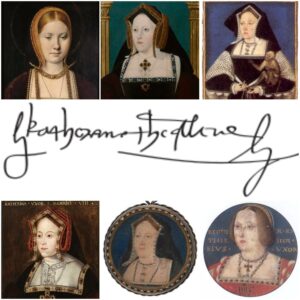 Today is the birthday of Catherine of Aragon, or Catalina de Aragón, so I wanted to take this opportunity to ask you for your thoughts on this 16th-century woman.
Today is the birthday of Catherine of Aragon, or Catalina de Aragón, so I wanted to take this opportunity to ask you for your thoughts on this 16th-century woman.
Even though she was married to Henry VIII for nearly 24 years, she’s so often ignored in favour of the wives who people perceive to be a bit more exciting. There is also sometimes the mentality that if you like Anne Boleyn then you’re “Team Anne” and can’t possibly like Catherine, but I find her fascinating.
Catherine was only fifty when she died, but what a life she led! She left her homeland of Spain, never to return, in 1501 at the age of fifteen to marry Prince Arthur, heir to the English throne, and then he died less than six months after their marriage! She served as the Spanish ambassador to England for a time and then married Henry VIII shortly after his accession to the throne. Catherine is left Regent of England in 1513 and her troops are victorious against the Scots at the Battle of Flodden, what a triumph!
After having experienced at least six pregnancies which resulted in miscarriages, stillbirths, the infant death of a son and one surviving daughter, Catherine is abandoned by her husband for a younger model. Not only that, but her husband has a surviving son by another woman who he has made Duke of Richmond and Somerset! This Spanish princess and Queen of England is banished from court and separated from her beloved daughter and spends her days worrying about the fate of her husband’s soul. Catherine never stops loving Henry VIII and dies believing herself to be his true wife and the real queen.
Phew! That’s just some of this queen’s life story!
It’s wonderful that her life has been re-examined recently by authors and historians like Giles Tremlett, Patrick Williams, Julia Fox and Amy Licence, don’t you think?
There are so many questions surrounding Catherine: Did she consummate her marriage to Prince Arthur? Should she have accepted the annulment of her marriage? Should she have followed the Pope’s advice and entered a convent? Why did she experience so many stillbirths?
Here are some links to articles about Catherine of Aragon but there are plenty more on this site so do have a browse.
- Catherine of Aragon – Right to fight?
- 16 December 1485 – Birth of Catherine of Aragon, First Wife and Queen Consort of Henry VIII
- Catherine of Aragon – The Boring One?
- The Pregnancies of Anne Boleyn and Catherine of Aragon
- Anne Boleyn and Catherine of Aragon Part 1
- Anne Boleyn and Catherine of Aragon Part 2
- The Death of Catherine of Aragon
- RIP Catherine of Aragon
- Did an Eating Disorder Prevent Catherine of Aragon having a Son?
- Catherine Sets Sail for England
- The Coronation of King Henry VIII and Queen Catherine
So, what do you think of Catherine? Have you read a good book on her? Please do share any thoughts, views, recommendations etc. you have regarding Queen Catherine of Aragon.